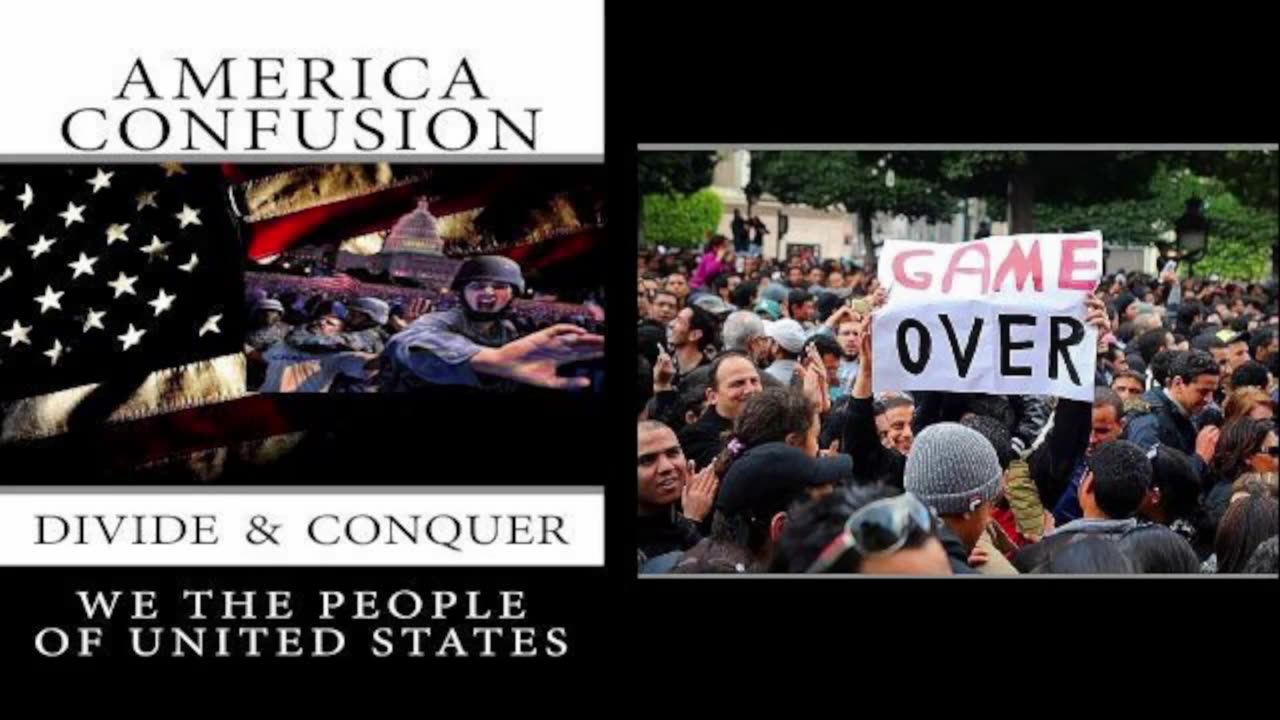Premium Only Content

America Confusion Divide And Conquer by Trey Knowles
America Confusion Divide & Conquer: by Trey Knowles
White people have been exposing Black people in America to sinful things so they can curse themselves. Did President Obama try to do the same thing back?
We are like sheep amongst wolves. So therefore be wise as a serpent but be harmless as a dove, as explained. America Confusion Divide & Conquer shows how one side of America sees America as good. The other side of America sees America as evil. You will learn how America is conquered and divided by confusion. World leaders have three objectives in mind: 1) recruit converts, 2) control lives, and 3) make money. You will learn the tricks and schemes to enforce a belief system often dividing the world into "good, aware, wonderful us" and "evil, unaware, ignorant them".
Confusion creates war within self and others. Criticism or complaints are handled by showing the subject that he, she or the systems are somehow flawed, not the group or the ideology being advanced. The subject is taught the system is always right and they are always wrong. Contrary to what might be professed, they soon learn through experience that the system's only true authority is Jesus. Chess match between Good Vs Evil fighting for sovereignty.
In America Confusion Divide & Conquer the plot is like this: The same way Balaam is hired to curse Israel, The enemy within curse America, by exposure. Unseen Spiritual warfare games are being played amongst the people of America through the principalities of America. Confusion comes in the claim of Christianity, used by the principalities as a weapon for deception.
The Ideology of Black Liberation Theology is used by President Obama to destroy the system of the United States. Obama knows he can't destroy America by force but if he destroys America by putting a curse on them as they did to his people. Why would President Obama pass a same-sex marriage act?
Just like the devil deceived and put the curse on Adam and Eve, President Obama is doing the same thing to America to destroy the system and free the people by using Saul Alinsky's Rules for Radicals Rule 4: “Make the enemy live up to its own book of rules.” You can kill them with this because no one can possibly obey all of their own rules. (This is a serious rule. The besieged entity’s very credibility and reputation is at stake, because if activists catch it lying or not living up to its commitments, they can continue to chip away at the damage.) "You can kill them with this, for they can no more obey their own rules than the Christian church can live up to Christianity."
People have become immune to a lifestyle or culture opposite to God's character. Wants and desires become a curse on a nation of people. False Prophet Behavior versus Antichrist behavior, sovereignty war of deception for human rights used by the weapon of wants and desires, just like the serpent did to Adam and Eve. See with your own eyes, this is what is happening in America.
The enemy within America uses sorcery against American citizens through American communication systems. The enemy within plays a role in the hearts and minds of people to divide America and kill its Constitution. The enemy within wants to become the False Moses and False Messiah. He works within the Democratic Party using the psychological tactics of Saul Alinsky's Rules for Radicals.
In 1971, Saul Alinsky wrote an entertaining classic on grassroots organizing titled Rules for Radicals. Those who prefer cooperative tactics describe the book as out-of-date. Nevertheless, it provides some of the best advice on confrontational tactics. Alinsky begins this way: What follows is for those who want to change the world from what it is to what they believe it should be. The Prince was written by Machiavelli for the Haves on how to hold power. Rules for Radicals is written for the Have-Nots on how to take it away. His "rules" derive from many successful campaigns where he helped poor people fighting power and privilege.
For Alinsky, organizing is the process of highlighting what is wrong and convincing people they can actually do something about it. The two are linked. If people feel they don't have the power to change a bad situation, they stop thinking about it.
According to Alinsky, the organizer, especially a paid organizer from outside, must first overcome suspicion and establish credibility. Next the organizer must begin the task of agitating: rubbing resentments, fanning hostilities, and searching out controversy. This is necessary to get people to participate. An organizer has to attack apathy and disturb the prevailing patterns of complacent community life where people have simply come to accept a bad situation. Alinsky would say, "The first step in community organization is community disorganization."
Through a process combining hope and resentment, the organizer tries to create a "mass army" that brings in as many recruits as possible from local organizations, churches, services groups, labor unions, corner gangs, and individuals.
Alinsky provides a collection of rules to guide the process. But he emphasizes these rules must be translated into real-life tactics that are fluid and responsive to the situation at hand.
Rule 1: Power is not only what you have, but what an opponent thinks you have. If your organization is small, hide your numbers in the dark and raise a din that will make everyone think you have many more people than you do.
Rule 2: Never go outside the experience of your people.
The result is confusion, fear, and retreat.
Rule 3: Whenever possible, go outside the experience of an opponent. Here you want to cause confusion, fear, and retreat.
Rule 4: Make opponents live up to their own book of rules. "You can kill them with this, for they can no more obey their own rules than the Christian church can live up to Christianity."
Rule 5: Ridicule is man's most potent weapon. It's hard to counterattack ridicule, and it infuriates the opposition, which then reacts to your advantage.
Rule 6: A good tactic is one your people enjoy. "If your people aren't having a ball doing it, there is something very wrong with the tactic."
Rule 7: A tactic that drags on for too long becomes a drag. Commitment may become ritualistic as people turn to other issues.
Rule 8: Keep the pressure on. Use different tactics and actions and use all events of the period for your purpose. "The major premise for tactics is the development of operations that will maintain a constant pressure upon the opposition. It is this that will cause the opposition to react to your advantage."
Rule 9: The threat is more terrifying than the thing itself. When Alinsky leaked word that large numbers of poor people were going to tie up the washrooms of O'Hare Airport, Chicago city authorities quickly agreed to act on a longstanding commitment to a ghetto organization. They imagined the mayhem as thousands of passengers poured off airplanes to discover every washroom occupied. Then they imagined the international embarrassment and the damage to the city's reputation.
Rule 10: The price of a successful attack is a constructive alternative. Avoid being trapped by an opponent or an interviewer who says, "Okay, what would you do?"
Rule 11: Pick the target, freeze it, personalize it, polarize it. Don't try to attack abstract corporations or bureaucracies. Identify a responsible individual. Ignore attempts to shift or spread the blame.
According to Alinsky, the main job of the organizer is to bait an opponent into reacting. "The enemy properly goaded and guided in his reaction will be your major strength."
Who was Balaam in the Bible?
In Numbers 22—24, we find the story about Balaam and the king of Moab, a man called Balak. King Balak wanted to weaken the children of Israel, who on their way to Canaan had moved in on his territory. Balak sent to Balaam, who lived in Mesopotamia along the Euphrates River (Numbers 22:5), and asked him to curse Israel in exchange for a reward. Balaam was apparently willing to do this but said he needed God’s permission.
Balaam, of course, had no power, in himself, to curse Israel, but, if God were willing to curse Israel, Balaam would be rewarded through Balak. God told Balaam, “You must not put a curse on those people, because they are blessed”. King Balak then sent “other officials, more numerous and more distinguished than the first”, promising a handsome reward. This time God said, “Go with them, but do only what I tell you”.
The next morning, Balaam saddled his donkey and left for Moab (Numbers 22:21). God sent an angel to oppose Balaam on the way. The donkey Balaam was riding could see the angel, but Balaam could not, and when the donkey three times moved to avoid the angel, Balaam was angry and beat the animal. “Then the Lord opened the donkey’s mouth”, and it rebuked the prophet for the beatings. “Then the Lord opened Balaam’s eyes, and he saw the angel of the Lord standing in the road with his sword drawn”.
The angel told Balaam that he certainly would have killed Balaam had not the donkey spared his life. Ironically, a dumb beast had more wisdom than God’s prophet. The angel then repeated to Balaam the instruction that he was only to speak what God told him to speak concerning the Hebrews.
In Moab, King Balak took the prophet Balaam up to a high place called Bamoth Baal and told him to curse the Israelites (Numbers 22:41). Balaam first offered fourteen sacrifices on seven altars and met with the Lord (Numbers 23:1–5). He then declared the message God gave him: a blessing on Israel: “How can I curse those whom God has not cursed? How can I denounce / those whom the Lord has not denounced?”
King Balak was upset that Balaam had pronounced a blessing on Israel rather than a curse, but he had him try again, this time from the top of Pisgah (Numbers 23:14). Balaam sacrificed another fourteen animals and met with the Lord. When he faced Israel, Balaam again spoke a blessing: “I have received a command to bless; / he has blessed, and I cannot change it” (verse 20).
King Balak told Balaam that, if he was going to keep blessing Israel, it was better for him to just shut up (Numbers 23:25). But the king decided to try one more time, taking Balaam to the top of Peor, overlooking the wasteland. Again, Balaam offered fourteen animals on seven newly built altars. Then “the Spirit of God came on him and he spoke his message” (Numbers 24:2–3). The third message was not what the Moabite king wanted to hear: “How beautiful are your tents, Jacob, your dwelling places, Israel!”.
Balaam’s three prophecies of blessing on Israel infuriated the king of Moab, who told the prophet to go back home with no reward: “Now leave at once and go home! I said I would reward you handsomely, but the Lord has kept you from being rewarded” (Numbers 24:11).
Before he left, Balaam reminded the king that he had said from the very beginning he could only say what God told him to say. Then he gave the king four more prophecies, gratis. In the fourth prophecy, Balaam foretold of the Messiah: “A star will come out of Jacob; a scepter will rise out of Israel. He will crush the foreheads of Moab, the skulls of all the people of Sheth”. Balaam’s seven prophecies were seven blessings on God’s people; it was God’s enemies who were cursed.
However, later on Balaam figured out a way to get his reward from Balak. Balaam advised the Moabites on how to entice the people of Israel with prostitutes and idolatry. He could not curse Israel directly, so he came up with a plan for Israel to bring a curse upon themselves. Balak followed Balaam’s advice, and Israel fell into sin, worshiping Baal of Peor and committing fornication with Midianite women. For this God plagued them, and 24,000 men died (Numbers 25:1–9; Deuteronomy 23:3–6).
Balaam’s name and story became infamous, and he is referred to several times in the New Testament. Peter compares false teachers to Balaam, “who loved the wages of wickedness” (2 Peter 2:15). Jude echoes this sentiment, associating Balaam with the selling of one’s soul for financial gain (Jude 1:11).
Finally, Jesus speaks of Balaam when He warns the church in Pergamum of their sin: “There are some among you who hold to the teaching of Balaam, who taught Balak to entice the Israelites to sin so that they ate food sacrificed to idols and committed sexual immorality” (Revelation 2:14). Satan’s tactics haven’t changed all that much. If he cannot curse God’s people directly, he will try the back-door approach, and idolatry and sexual immorality are his go-to temptations.
What is the pride of life?
The phrase “pride of life” is found only once in the Bible, in 1 John 2:16, but the concept of the pride of life, especially as it is linked with the “lust of the eyes” and the “lust of the flesh,” appears in two more significant passages of Scripture—the temptation of Eve in the Garden and the temptation of Christ in the wilderness (Matthew 4:8-10).
The pride of life can be defined as anything that is “of the world,” meaning anything that leads to arrogance, ostentation, pride in self, presumption, and boasting. John makes it clear that anything that produces the pride of life comes from a love of the world and “if anyone loves the world, the love of the Father is not in him” (1 John 2:15).
The first example of the temptation of the pride of life occurs in the Garden of Eden, where Eve was tempted by the serpent to disobey God and eat the forbidden fruit of the tree of knowledge of good and evil. Eve perceived that the fruit was “good for food,” “pleasing to the eye,” and “desirable for gaining wisdom” (Genesis 3:6). She coveted the fruit in three ways.
First, it was appealing to her appetite. This John refers to as the “lust of the flesh,” the desire for that which satisfies any of the physical needs. The fruit was also pleasing or delightful to the eye, that which we see and desire to own or possess. Here is the “lust of the eyes” John refers to. Finally, Eve somehow perceived that the fruit would make her wise, giving her a wisdom beyond her own. Part of Satan’s lie was that eating the fruit would make her “like God, knowing good and evil” (Genesis 3:5).
Here is the essence of the pride of life—anything that exalts us above our station and offers the illusion of God-like qualities, wherein we boast in arrogance and worldly wisdom. Eve wanted to be like God in her knowledge, not content to live in a perfect world under His perfect grace and care for her.
Satan tried these same three temptations on Christ during His 40 days in the wilderness (Matthew 4:1-11). He tempted Jesus with the lust of the flesh, bread for His hunger, the lust of the eyes, “all the kingdoms of the world with their splendor”, and the pride of life, daring Him to cast Himself from the roof of the Temple in order to prove that He was the Messiah by an ostentatious display of power that was not in the will of God or His plan for the redemption of mankind. But Jesus, though He was “tempted in every way, just as we are” (Hebrews 4:15), resisted the devil and used the Word of God to ensure victory over him.
Christians have always been, and will always be, lured by the same three temptations Eve and Jesus experienced. Satan doesn’t change his methods; he doesn’t have to because they continue to be successful. He tempts us with the lust of the flesh—sexual gratification, gluttony, excessive alcohol consumption, and drugs, both legal and illegal, as well as the “deeds of the flesh” about which Paul warned the Galatians, “sexual immorality, impurity, sensuality, idolatry, sorcery, enmity, strife, jealousy, fits of anger, rivalries, dissensions, divisions, envy, drunkenness, orgies, and things like these” (Galatians 5:19-21). He tempts us with the lust of the eyes—the endless accumulation of “stuff” with which we fill our homes and garages and the insatiable desire for more, better, and newer possessions, which ensnares us and hardens our hearts to the things of God.
But perhaps his most evil temptation is the pride of life, the very sin that resulted in Satan’s expulsion from heaven. He desired to be God, not to be a servant of God (Isaiah 14:12-15). The arrogant boasting which constitutes the pride of life motivates the other two lusts as it seeks to elevate itself above all others and fulfill all personal desires. It is the root cause of strife in families, churches, and nations. It exalts the self in direct contradiction to Jesus’ statement that those who would follow Him must take up their cross (an instrument of death) and deny themselves.
The pride of life stands in our way if we truly seek to be servants of God. It is the arrogance that separates us from others and limits our effectiveness in the kingdom. The pride of life “comes not from the Father, but from the world.” And, as such, it is passing away with the world, but those who resist and overcome the temptation of the pride of life do the will of God, and “the man who does the will of God lives forever” (1 John 2:17).
-
 LIVE
LIVE
LumpyPotatoX2
2 hours agoSCUM: Lumpy Land RP Server - Day #1 - #RumbleGaming
40 watching -
 1:42:59
1:42:59
Game On!
15 hours ago $4.89 earnedTop 10 Super Bowl Bets You Can't Afford To Miss!
30.2K4 -
 2:17:02
2:17:02
Tundra Tactical
19 hours ago $18.57 earnedTundra Nation Live : Shawn Of S2 Armament Joins The Boys
123K26 -
 11:00:11
11:00:11
tacetmort3m
1 day ago🔴 LIVE - SOLO RANK GRINDING CONTINUES - MARVEL RIVALS
180K3 -
![Shadows Of Chroma Tower, Alpha Playtest [Part 1]](https://1a-1791.com/video/fwe2/1d/s8/1/5/Q/U/n/5QUnx.0kob-small-Shadows-Of-Chroma-Tower-Alp.jpg) 13:29:21
13:29:21
iViperKing
22 hours agoShadows Of Chroma Tower, Alpha Playtest [Part 1]
150K8 -
 54:05
54:05
TheGetCanceledPodcast
20 hours ago $13.53 earnedThe GCP Ep.11 | Smack White Talks Smack DVD Vs WorldStar, Battle Rap, Universal Hood Pass & More...
133K23 -
 13:37
13:37
Exploring With Nug
1 day ago $9.20 earnedSUV Found Underwater Searching For Missing Man Jerry Wilkins!
93.1K4 -
 2:58:21
2:58:21
xBuRnTx
18 hours ago1st Warzone Stream Online
121K11 -
 6:10:21
6:10:21
JdaDelete
1 day ago $23.84 earnedDino Crisis - Sega Saturday
175K7 -
 23:22
23:22
MYLUNCHBREAK CHANNEL PAGE
1 day agoUnder The Necropolis - Pt 5
135K62